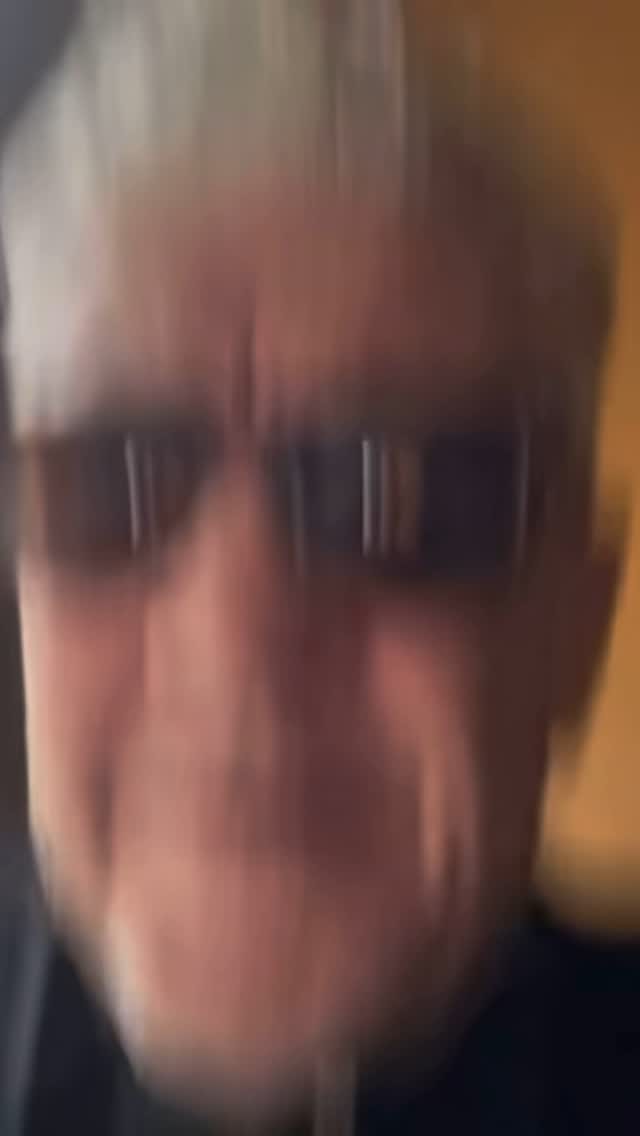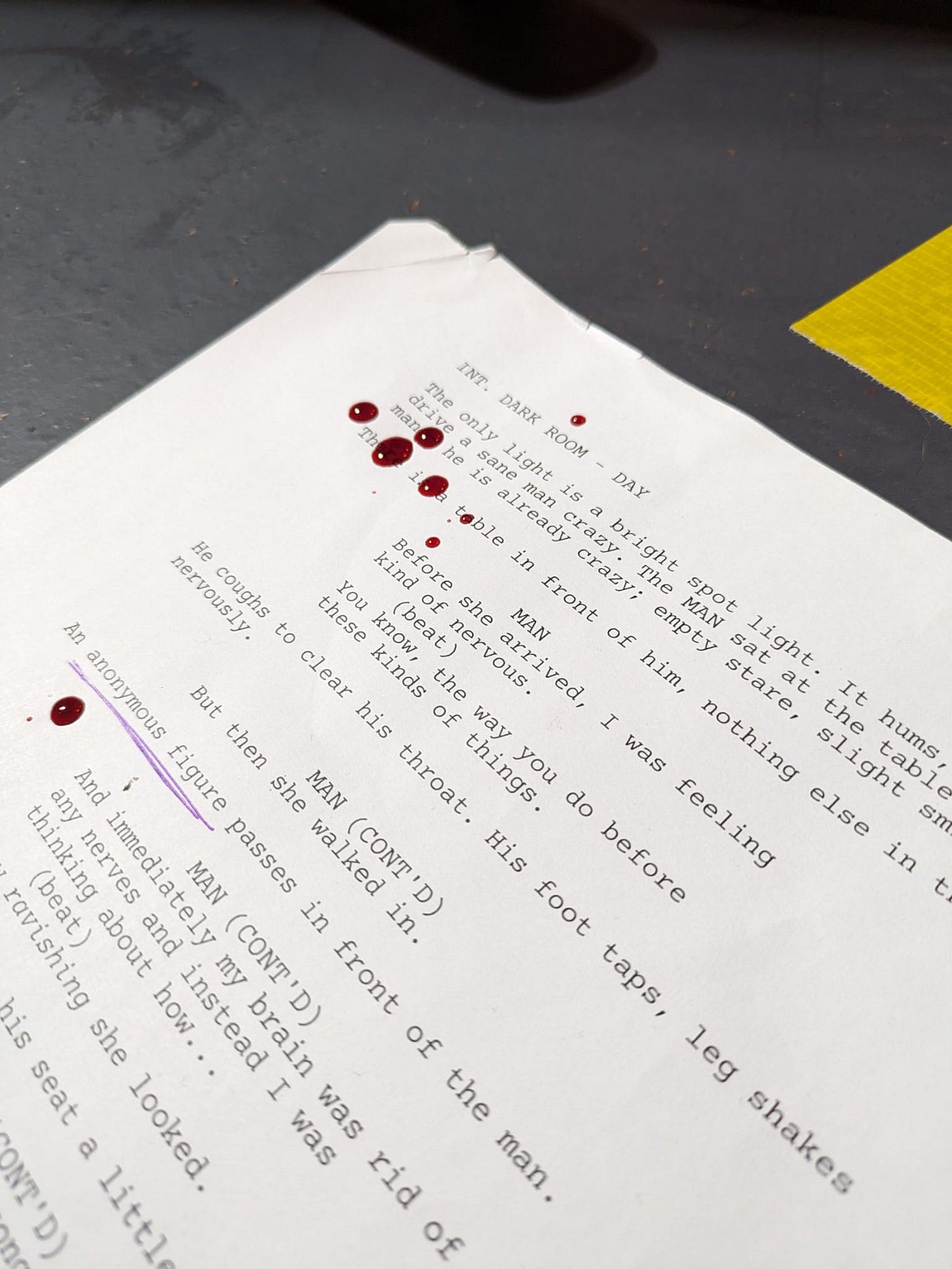For the first time in years, I made a film
Reflections on the joys of sharing a product with an audience again, creating for the sake of creating, and how David Lynch's death helped me to re-capture my creative drive.
Earlier this year, I did something I hadn’t done for a decade: I made a film. I made a film and I shared it with an audience. It’s called First Ate, and you can now watch it on YouTube.
For the longest time, I felt stuck, creatively. I had written a number of screenplays: shorts, features, sitcoms, drama series, but none of them have made it to the screen. The obstacle of funding prevented me from doing it for myself, the need to work endless hours to afford to live in the world’s most expensive city got in the way of my ability to network, and so these scripts sat on my hard drive collecting their digital dust. Sure, there had been some outlets for creativity, like posting blogs, sharing poems and short stories via the internet; I performed stand-up as a means of getting work out there; nothing, however, achieved the goal I had moved to London for - writing scripts that others would watch. It’s easy to blame other things: pandemics, funding, fatigue, jobs, relationships, friendships, gatekeepers. But fundamentally, the only thing I was being gatekept from was my own creativity. The only gatekeeper was me. I needed something to snap me out of it.
In January this year, David Lynch - one of the purest creatives to have ever walked this planet - died. This is a man responsible for a film that opened my eyes to a world beyond formulaic storytelling, the first time I saw Lost Highway; a man I hold responsible for the styling choices of most of my ex-partners; a man responsible for one of my favourite clips to hit the internet.
Beyond the personal impact he had on me, David Lynch symbolises creating for the sake of creating. He would ask wannabe filmmakers to go out to truly understand their idea, and let the idea be the driver behind everything, not what you think an audience or somebody with funding might like, but make the best film in the sense of how well it brings your idea to life. This is a man who absolutely practised what he preached in that regard. This is a man who, in addition to his feature films (most of which were nominated for Academy Awards) and his television work (which is looked on as some of the most influential television of all time), also has a YouTube channel with 1.8k videos posted to it. While not all are ‘films’ as such, there is no doubting that this man was constantly creating.
As an educator, I was responsible for telling students endlessly that the best way to learn about filmmaking was to make a film, that the best reason to create a film was for the sake of creating it. As a creative, as a filmmaker, I did neither of these things. I had become a man who was more of a “do as I say, not as I do” teacher, rather than someone who practised what they preached. David Lynch’s passing was the kick up the backside I needed to go and make a film for the sake of making it.
Re-vitalised in terms of my creativity, I was quickly reminded of the same constraints that I had previously: no budget, no cast, no crew, limited equipment. I was going to be making the film completely alone, something which previously felt daunting this time felt liberating. I was not making a film for anybody else’s tastes, or seeking anybody else’s permission - I had complete creative freedom. Well, ‘complete’ as long as it didn’t cost any money, could be shot using a static camera on a tripod, and could be shot in the two free hours I had that day.
Rather than being scared by these restrictions, I found them liberating. The rules I was writing to were set by myself, not by anybody else, and not by second-guessing what may help further my career or get me funding. I was writing the film that I wanted to make, a strange film, but one that I felt I was capable of bringing to life. I am a writer, really, not a writer-director-actor-sound-recordist-editor-make-up-artist - but at least I knew the limitations of my budget and my crew, and I wrote the script I knew I could bring to life: so I did.
I hated watching myself back. I regretted my decision to cover my face in golden syrup. But I had a wail of a time seeing something leave my screenwriting software and get covered in fake blood while I did my best to bring it to life. It isn’t a conventional film, but I didn’t want it to be; I just wanted it to exist. I found ways of holding a boom mic with my knees to capture sound most effectively; I played around with motion in post-production to create a sense of movement when I could only use static cameras; I perfected a rather tasty recipe for fake blood; I wrote a script for a client who was unwilling to pay even the littlest fee and the strictest criteria. I learnt a lot, and I had a great time doing it. Far from perfect, technically, the film had achieved so much more than perfection: it brought me joy. High on the joy that came with completing my first film since I was in my first year at university, I started slinging it off to this festival and to that, and before long, it was showing at a short film night.
While I have posted stories, photos, poems and personal essays online, this was the first time being live with an audience in the room since I finished performing stand-up. It was just as nerve-wracking. Where your online audience and engagement is generally reduced to facts and figures about how many people liked or shared or stopped reading after 20 seconds, being in the room with your audience allows you to see what their emotional responses are. The raw emotional response, not the one that they’ve had time to type up and comment on, but their physiological reactions. Memories came flooding back of gigs where it felt like there would be maybe one or two laughs across a 10-minute slot, and the nerves took over me; I regretted my decision to share and wanted to leave. But then the unthinkable happened. People laughed at the (darkly) funny parts. People said “eww” at the truly gross parts. People reacted the way I wanted them to. Not all of them, of course, but enough to let me know that despite technical and performance imperfections, as a filmmaker I had done my job: I had made the audience feel something.
This film has been rejected from more festivals than it has been accepted to. It is in no way a script that I feel will progress my writing career. But as a film, as a project that I saw through to completion, I could not be more proud of it.


